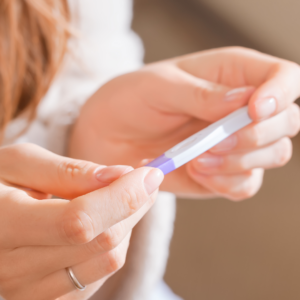 It is crucial to determine if you are pregnant as soon as medically possible, especially after having unprotected sex. Unprotected intercourse, or sex without a condom, refers to sexual activity in which there is no barrier method used to prevent pregnancy.
It is crucial to determine if you are pregnant as soon as medically possible, especially after having unprotected sex. Unprotected intercourse, or sex without a condom, refers to sexual activity in which there is no barrier method used to prevent pregnancy.
The timing of a pregnancy test is crucial, and it’s important to know when to take one. If you think you might be pregnant, it’s recommended to take a pregnancy test at least two weeks after unprotected sex or the date of your expected period.
The Right Time For A Pregnancy Test
It’s recommended to wait at least two weeks after having unprotected sex to take a pregnancy test for the most accurate results. This is because it can take up to two weeks after fertilization for the body to produce enough pregnancy hormones to be detected by a pregnancy test. However, if the next period’s due date is known, it’s recommended to wait until at least one day after the expected period start date to take a pregnancy test.
If you have had unprotected sex and do not wish to become pregnant, there are options available to reduce the risk of pregnancy. One option is the Ella morning-after pill, which can be taken up to five days after unprotected sex to help prevent pregnancy. Other options include using emergency contraception, such as Plan B, or discussing long-term contraceptive options with a healthcare provider. Plan B is best taken 72 hours after unprotected sex.
Different Types of Pregnancy Tests
When it comes to testing methods, there are two options: at-home tests or tests administered by a doctor. At-home pregnancy tests are easy to use and can provide accurate results. It’s important to follow the instructions carefully and read the results within the specified timeframe. If an at-home pregnancy test is positive, it’s recommended to schedule an appointment with a healthcare provider to confirm the results and discuss next steps.
If the test is negative and you still have concerns, it’s important to reach out to a healthcare provider for guidance. It’s also important to note that there are myths surrounding pregnancy, such as the idea that it’s not possible to get pregnant after a menstrual cycle. This is not true – it is possible to become pregnant at any point during the menstrual cycle.
It’s important to note that some women may experience vaginal bleeding or spotting during pregnancy, which can be mistaken for a menstrual cycle. However, this is not a true period and is usually caused by implantation bleeding or other factors such as cervical irritation or infection.
If you are experiencing bleeding during pregnancy, it’s important to speak with a healthcare provider to determine the cause and ensure the health of both you and your baby. Bleeding during pregnancy can sometimes be a sign of a serious condition, such as an ectopic pregnancy or a miscarriage.
Key Takeaways
For the most accurate results, it’s best to take a pregnancy test at least two weeks after having unprotected sex. If the next period due date is known, wait until at least one day after the expected period start date. If the due date is unknown, wait at least two weeks after having unprotected sex.
At Women’s Health Specialists, our compassionate and knowledgeable physicians and staff are available to provide guidance and support throughout the entire process of pregnancy testing and beyond. We can provide information on the best time to take a pregnancy test and offer guidance on next steps based on the test results. Whether you need information about preventing pregnancy or assistance with confirming a positive test result, Women’s Health Specialists are here to help.
If you’d like to learn more, visit our pregnancy page or schedule an appointment today.